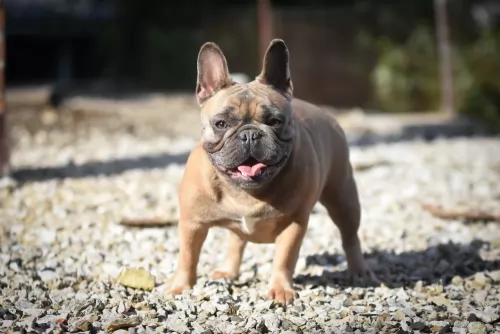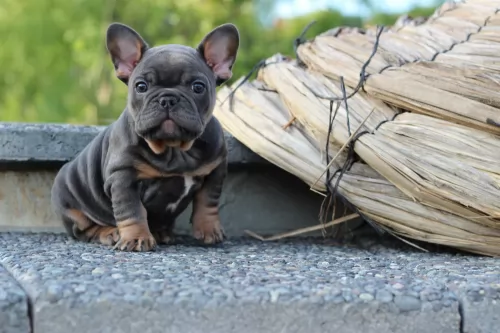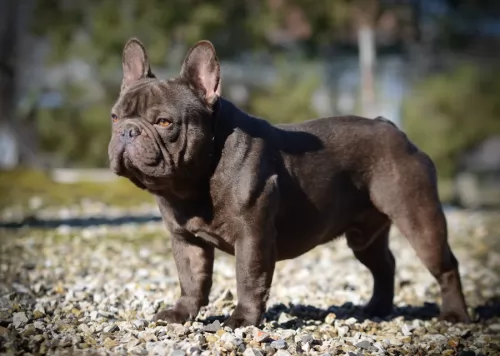 Petzlover
Petzlover French Bulldog is originated from France but West Siberian Laika is originated from Russia. French Bulldog may grow 26 cm / 10 inches shorter than West Siberian Laika. French Bulldog may weigh 9 kg / 19 pounds lesser than West Siberian Laika. Both French Bulldog and West Siberian Laika has almost same life span. French Bulldog may have less litter size than West Siberian Laika. Both French Bulldog and West Siberian Laika requires Low Maintenance.
French Bulldog is originated from France but West Siberian Laika is originated from Russia. French Bulldog may grow 26 cm / 10 inches shorter than West Siberian Laika. French Bulldog may weigh 9 kg / 19 pounds lesser than West Siberian Laika. Both French Bulldog and West Siberian Laika has almost same life span. French Bulldog may have less litter size than West Siberian Laika. Both French Bulldog and West Siberian Laika requires Low Maintenance.
 The french bulldog originated in England and are bred expecting small size bulldogs. Many lace workers in Nottingham had little bulldogs and when they emigrated to france, they brought their dogs with them. Soon they become popular in France and Europe. Then Americans showed interest in them.In 1896 frenchie was shown in United states in a show and after that they got their nickname "Frechie".
The french bulldog originated in England and are bred expecting small size bulldogs. Many lace workers in Nottingham had little bulldogs and when they emigrated to france, they brought their dogs with them. Soon they become popular in France and Europe. Then Americans showed interest in them.In 1896 frenchie was shown in United states in a show and after that they got their nickname "Frechie".
 The West Siberian Laika come from the Khanty and Mansi tribes of West Siberia and Ural. They are a primitive breed used for hunting and come from the spitz and wolf lines. They retain many of their primitive looks and traits to this day. They were pre-historic companions to human hunters and remain so today in the northern regions of the Russia. They were never sled dogs but pure hunters throughout their journey to a domesticated breed. They hunted in the forests of the mountainous regions and were adapted to hunting in the woods. When their prey was hunted almost to extinction, the Laikas were also in danger of disappearing.
The West Siberian Laika come from the Khanty and Mansi tribes of West Siberia and Ural. They are a primitive breed used for hunting and come from the spitz and wolf lines. They retain many of their primitive looks and traits to this day. They were pre-historic companions to human hunters and remain so today in the northern regions of the Russia. They were never sled dogs but pure hunters throughout their journey to a domesticated breed. They hunted in the forests of the mountainous regions and were adapted to hunting in the woods. When their prey was hunted almost to extinction, the Laikas were also in danger of disappearing.
From the early days of the 1900’s through the first World War, there were several campaigns to save the WSL from extinction. A breed standard was developed around the 1930’s. Following the war the breeding programs became more uniformed and followed the standard that was in place. World War II disrupted it again, but once again it was resumed after the war.
The breed was once again threatened by industrialization and deforestation in the early 20th century, as they were replaced by newer, more popular breeds. There were thought to be dozens of aboriginal Laikas with various groups attached to different groups of indigenous hunters.
Following the second World War and the ever increasing detail of breed standards, the Laikas were divided into four pure bred groupings: the West Siberian Laika, the East Siberian Laika, the Russ-European Laika and the Karelo-Finnish Laika. All of these breeds are Laikas because they are bark pointing hunters.
They were imported to the U.S. in the early 1990’s by a Russian immigrant. Vladmir Beregovoy is credited with bringing the breed to the States. There are now about 300-400 West Siberian Laika’sin the U.S. They are a very emotional breed, very in touch with his human’s feelings, habits and intentions. He is a barker for sure who hates to be left alone. An intense breed with the need for companionship and a purpose. They will do anything to escape a pen if left alone for long periods of time.
The breed is protective of its people with other animals and some are wary of strangers. He needs an active family to match his active spirit. They will bark at all wild life including all the squirrels in your yard. So if don’t want a “barker”, don’t get a West Siberian Laika.
They are recognized by the United Kennel Club, the American Canine Association the Dog Registry of American and the Federation Cynologique Internationale
 Frenchie is a good companion dog and has a powerful muscular body. They like to play but also likes to relax for more time. They are intelligent and training them is very easy until they think it a game. They are free thinkers and are not very good in obedience. Frenchies should not be leaved alone for a long time.They love spending time with humans and generally they get along with everyone. They are excellent watchdogs and alerts when strangers come.
Frenchie is a good companion dog and has a powerful muscular body. They like to play but also likes to relax for more time. They are intelligent and training them is very easy until they think it a game. They are free thinkers and are not very good in obedience. Frenchies should not be leaved alone for a long time.They love spending time with humans and generally they get along with everyone. They are excellent watchdogs and alerts when strangers come.
French bulldog suits very well in apartments. But they should be made to walk for fifteen minutes daily to avoid over weight. They should not be kept outside on hot days. Frenchies will be very happy if you stay in home. They will follow you wherever you walk inside the house. They love people so much, such that people who own a Frenchie can not imagine life without them.
 The WSL comes from the Spitz line and also directly descendent from the wolf. They look and act a lot like a wolf in many ways. They have retained much of their primitive traits. With a pointed, long muzzle, an almost square head, and square body, they have wolf colored coats of gray and red. They are mostly medium in size but some can be smaller or larger. Their head is shaped like a wedge, their eyes are typical almond shape and set deep in their head. They are brown or even darker. The muzzle is almost as long as the skull. Their lips are thin and black. The ears are straight up and pricked.
The WSL comes from the Spitz line and also directly descendent from the wolf. They look and act a lot like a wolf in many ways. They have retained much of their primitive traits. With a pointed, long muzzle, an almost square head, and square body, they have wolf colored coats of gray and red. They are mostly medium in size but some can be smaller or larger. Their head is shaped like a wedge, their eyes are typical almond shape and set deep in their head. They are brown or even darker. The muzzle is almost as long as the skull. Their lips are thin and black. The ears are straight up and pricked.
They have bodies longer than they are tall with a lot of musculature. They carry their tail high over their backs. With straight legs and forward feet, with gray, red and white coats, they still look like wild dogs.
 They are good children friendly dogs as they like to play with them. It will be good if they are supervised by an adult.
They are good children friendly dogs as they like to play with them. It will be good if they are supervised by an adult.
They are polite with everyone including other pets. They love to play games and chase balls but don't need much exercise.
Frenchies adapts well for apartment living but they don't like being alone for long time. They will not tolerate both hot and cold weather and so air conditioning will be better.
French Bulldogs are easy to train and are very much interested in playing.
 3.Adaptability This is not really an apartment dog though he can adapt. He needs outdoor space to run everyday. So if in an apartment find a dog park for everyday use.
3.Adaptability This is not really an apartment dog though he can adapt. He needs outdoor space to run everyday. So if in an apartment find a dog park for everyday use.
4.Learning ability – Highly trainable and very smart. Independent thinker though might cause some issues.
 Frenchies can suffer from Von Willebrand's disease(VWD)and thyroid condition. Due to their flat faces they suffer from elongated soft palate or cleft palate. Because of their compacted air way they have inability to effectively regulate temperature.
Frenchies can suffer from Von Willebrand's disease(VWD)and thyroid condition. Due to their flat faces they suffer from elongated soft palate or cleft palate. Because of their compacted air way they have inability to effectively regulate temperature.
Any indication that the hair is unhealthy, such as brittleness and hair loss, should be addressed immediately to avoid any further damage. Hair loss becomes a problem when it becomes excessive, possibly due to disease or a particular condition.
 Health wise there are no genetic health issues known today. Since they were so wild, primitive and isolated there was not a lot of inbreeding to any standards. There are however some interesting health facts about the WSL.
Health wise there are no genetic health issues known today. Since they were so wild, primitive and isolated there was not a lot of inbreeding to any standards. There are however some interesting health facts about the WSL.
• Females only come into estrus once a year, usually in the late winter. They are usually one to two or two and a half years old when this happens. The Russians who know them best frown on breeding them before they are at least two.
• They are subject to many of the same parasites and some diseases like any other canine. But they are not susceptable to any illness specific to their breed.
• Hunting accidents might bet he biggest health threat this breed faces at the moment.
• However with more dogs being bred for the show ring, this could all change and genetic issues could begin to pop up for them.
 As with all dogs, proper nutrition makes your French Bulldog a happy, healthy pup. He should have his own food and water bowls. Don't feed your French bulldog puppy, uncooked meat or food that may have gone bad. Young puppies need relatively large amount of food in order to meat the demands of their rapidly growing bodies and their hectic lifestyle. Feed your puppy specially designed chewing treats from reputable pet stores.
As with all dogs, proper nutrition makes your French Bulldog a happy, healthy pup. He should have his own food and water bowls. Don't feed your French bulldog puppy, uncooked meat or food that may have gone bad. Young puppies need relatively large amount of food in order to meat the demands of their rapidly growing bodies and their hectic lifestyle. Feed your puppy specially designed chewing treats from reputable pet stores.
According to the French BullDog Club of America, there are no specific guidelines for feeding them. Options for feeding your French Bulldog are commercial dry food, canned food, raw food and homemade meals. Calories required for frenchie varies depending on size, age, activity level and metabolism.
Frenchies can be made to walk or run for a particular distances. Heavy exercises should not be given as they face respiratory problems. Avoid exercising them in hot weather as they have chances of getting heatstroke.
 performance, working dog food. High in protein and fat is needed to maintain their lean muscle. Don’t over feed them as they will become obese and they will be unhappy if their physical activities are restricted, even if by their own weight. Be sure you break up their day’s food amount into 3-4 smaller meals.
performance, working dog food. High in protein and fat is needed to maintain their lean muscle. Don’t over feed them as they will become obese and they will be unhappy if their physical activities are restricted, even if by their own weight. Be sure you break up their day’s food amount into 3-4 smaller meals.
2.Feeding the adult – Almost everything is equally true for the adult. They need a high protein and high fat food – a high performance food. Don’t over feed and give them at least 2 meals per day.
3.Points for Good Health – as previously mentioned this is a hardy and robust breed,
4. Games and Exercises They need a lot of exercise, have a strong prey drive and are very intelligent. A dog with those traits that does not get enough exercise will drive you crazy if he is not stimulated.